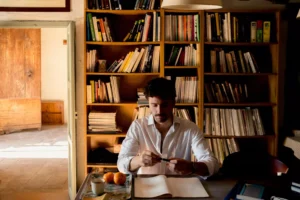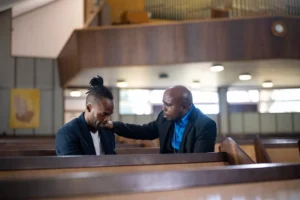Twenty-one: that’s how many times I’ve crossed the Atlantic — and how many times I’ve dealt with jet lag. I’ve learned that there’s no way to reason with my internal clock; I’ve just got to be patient until it catches up with the seven-hour gap. One of its oddest side effects? For about a week, I hardly ever feel hungry. This might sound good, but if I’m distracted, nothing reminds me to stave off a blood sugar crash, a shortened temper, and a tiny attention span. No hunger pangs to say, Eat! Before it’s too late!
There’s a lot of talk in the single world about the biological clock. We know it’s ticking; we know that eventually, it will run down. In my 30s, I’ve learned that it also comes equipped with hunger pangs: In the midst of a happy, distracted life come occasional stabs of realization in which the love of a good man and the gift of children take on poignant, urgent beauty.
Men, too, are affected by time: by diminishing opportunity to marry a woman of child-bearing age and lessening lifespan in which to raise a child. We wonder:
Will I get to pass on my name, my laugh, my passions, my quirks?
When I’m old, will anyone care about me?
Decades after I die, will anyone remember who I really was?
Does this seem like a cruel reality? Sometimes it does. But I am coming to realize that this hunger is a gift. Although society or our own selfish or worthy pursuits may have dulled our sense of time, God set the biological clock with an alarm. It says, “Choose now! While you still can.”
Do we always have the means to satisfy this hunger? No, sometimes the choice is out of our hands: We cannot marry, and we cannot have children.
How tender-hearted God is to those who long to have this legacy! To those who are forced into childlessness, who feel fruitless and unneeded and left out, to them He promises a legacy far better, even, than the love carried on by precious children (Isaiah 56:3-7).
And that is saying a lot.
Does this still seem like a tragedy? To some of us, it does. Yet I’m convinced our hunger is meant to point to us to another reality, one in which all of us can share.
Recognizing My Role Models
Recently, I began retracing the steps that led me to live overseas. While leafing through old papers and talking to older people, I learned that my interest in Israel — which seemed to spring out of nowhere when I was 16 — well, it actually had a source.
And one of those sparks was a 40-something lady with whom I shared an eight-hour road trip. I remember that she taught me a Hebrew song. My dad remembers so much more: On that trip, she answered his dozens of questions about Israel. I learned that she first visited there the year I was born and kept returning to invest in a nation not her own.
She died single and childless, just four years after our talk.
What legacy did she leave behind? I know three things, and I daresay others know so much more. She helped start a food bank in Jerusalem, which is still in operation today. She left some blind ladies in Bethlehem whose faces still radiate the beauty of Jesus. And she left a young woman who’s still learning the deep-down joy of investing in others.
That’s me.
I wonder: Was she like my single friend who is scared to think in depth about her future, lest she lurch toward despair? Did she ask the questions we do?
Have I done something wrong to doom myself to singleness?
Do I matter to anyone, when I’m in this stage of life?
Will I make it — emotionally, financially or spiritually — if I never marry?
If I’m afraid of my future, how can I have any positive impact on the world, let alone a long-term legacy?
I wonder how many of our role models are unaware of what a blessing they actually are. Though I can’t see mine often, just knowing there are men and women of integrity in the world gives an incredible boost to my inner strength.
My adopted big sister lives overseas, like me. She might scoff if I said how much she means to me: that I look up to her discipline in memorizing Scripture, in doing hard things, in wisely considering or releasing potential romance. She struggles — how she struggles — and what incredible grace she has to keep saying to Jesus, “Lord, to whom shall we go? You have the words of life”(John 6:66-68).
I’ve written about Jonathan, who sacrificed his life during World War II, never raising children of his own. I’ve mentioned his childless nephew Ivan, who invests in young men and in his widowed sister’s children. They, and others like them, have showed me what’s so gloriously right about God’s design for men.
My friend Caroline looks up to her friend Ashley: “She sees college students (younger than she) finding love and getting married every day, but she has never just given up and married someone because she wanted to get married. She waits on God. She doesn’t waste these years of singleness, but lives a full, rich life, knowing she has a lot to offer during this season.”
Katie is inspired by her co-worker, April, and by Elisabeth Elliot, who walked through long periods of singleness, by “their total abandonment to Jesus and how they live life passionately without waiting for someone to walk with them.”
Johanna says that the godly dedication of women like Amy Carmichael kept her from fearing singleness.
Elisabeth Elliot was also inspired by Amy Carmichael, a never-married woman who rescued children from trafficking in India. But what kept Amy? How has she managed to leave such a legacy of courage, even now, over 60 years after her death?
Just months after she arrived overseas at age 25, Amy retreated to a cave to pray because she had begun to fear the future:
The devil kept on whispering, ‘It’s all right now, but what about afterwards? You are going to be very lonely.’ And he painted pictures of loneliness — I can see them still.
We’re created for companionship; our hearts tell us this, and God’s Word agrees (Genesis 2:18).
I turned to my God in a kind of desperation and said, ‘Lord, what can I do? How can I go on to the end?’
It’s not natural to live a fulfilled and fearless single life; it’s a gift, one that may last a day or a lifetime, as it did for Amy. It began with God’s answer to her desperation:
He said, ‘None of them that trust in Me shall be desolate.’ That word has been with me ever since. It has been fulfilled to me. It will be fulfilled to you.[note]From a letter to one of Amy’s adopted children, quoted in Frank Houghton’s Amy Carmichael of Dohnavur (SPCK: London, 1953), 62. Amy is referring to Psalm 34: 22, KJV.[/note]
Later, she would compare her fruitful single life to an airplane, which flies despite the law of gravity (meaning the need to be married), because another power is at work from within.[note]In Elisabeth Elliot, A Chance to Die: The Life and Legacy of Amy Carmichael (Revell: Grand Rapids, 2005), 301, Amy Carmichael quotes Philippians 2:13.[/note]
Recognizing God’s Gifts
Jeanie was just an ordinary saint, yet after her sweetheart died, she spent her life in mentoring other women. Though she was gone long before I was born, I was given a copy of one of her letters. Well into my 20s, I was crippled by shyness, but Jeanie wrote that God had lodged a gift — gifts, even — in me. I couldn’t keep them to myself, because they weren’t mine; they were meant for the others in Christ’s body. Despite my personality, I had to accept the truth:
I have something to offer.
I must offer it.
And — I can.
Somehow, I believed her. I believed God’s Word. I stepped forward, where once I would have shrunk back. I stepped into friendships, onto flights, and into classrooms; I invested time, I offered words, I opened my heart, and I’ve found fruit. That’s the work of God’s Spirit and Jeanie’s legacy in me.
Like raising children, legacy starts very small. You prepare well, you nurture, and you watch it grow. Then you send it out into the world, and it continues on, long after you are gone. Not until heaven will you know the full tale.
I don’t have to know how long I’ll be single. Right now, I can reach out to my role models, seeking their wisdom and telling them what a strength they are. I can lavishly invest the gifts and opportunities God has already given me (Luke 17:12-19; Matthew 25:14-21; Matthew 6:21).
When Jesus was on earth, He traveled light (a robe and a pair of sandals; 12 friends for the road). Perhaps lightest of all was His heart and mind; He carried no agenda but one: Whatever I see my Father doing, I do that, too (John 5:19). The desire to leave a legacy can be a hard taskmaster, but it makes a great caboose. “Seek first the kingdom,” said Jesus. Everything else you really need will follow behind you (Matthew 6:33).
Everything else you really need.
It will be provided:
Like hunger. It keeps me from running the day’s marathon on empty. Isn’t that a gift?
Like danger. It keeps me awake. Even in Jerusalem, it’s easy to think, Rockets will never rain down here. Yet sometimes they do. Wherever we are, it’s easy to think that cancer won’t strike, that my job will always be mine, that I’ll never experience injustice or be disappointed by a friend, yet “many are the afflictions of the righteous” (Psalm 34:19).
Like suffering. It stirs up my hunger and thirst for heaven. Thank God for the pangs of a waning biological clock, which rescue us from feeling we have forever on earth. What a costly luxury! Far, far too costly not to be grateful for God’s alarm system, to cry painful joy though the labor pains He gives us, to ricochet from hunger pangs to “taste and see that He is good!”(Romans 8:18-23; Psalm 34:8).
Friends, lifelong singleness (if it comes) is not going to kill us. Lifelong poverty will not imprison us. Lifelong sufferings, whether they come in drips or waves, will not overwhelm us. We will be surprised by joy. It will come in sprinkles, and it will come in tsunamis. And every small sacrifice we make for others, every investment we make in heaven, every hidden decision we make because we want Jesus to smile — they’ll figure largely in that joy. I think you’ll be stunned at how huge they will loom and how small the price will seem.
I think you will be amazed at the legacy you leave behind.
Copyright 2015 Elisabeth Adams. All rights reserved.










